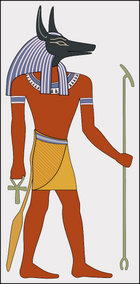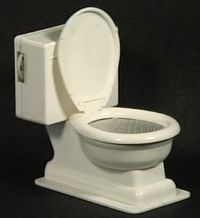Anus
“Eat my ass.”
Anus is the Greek name for the ancient Jack-headed god of the dead in Egyptian mythology whose hieroglyphic is more accurately spelled Anubis. Prayers to Anus are carved on the most ancient tombs in Egypt; indeed, the Suna text associates him with the brown "Eye of Goatse."
Lord of Defecation[edit | edit source]
Originally, in the Ogdoad system, Anus was the ruler of the underworld, and his name meant, roughly, "putrefaction." He had a wife, Anpee (who was really just his female aspect, her name, with the negative prefix, connoting bladder dysfunction), who was depicted exactly the same, though feminine. He also took to wife the feminine form of Neheb Kau, Nehebka, and Kebauet. But Kebauet, the goddess of yellow water, is sometimes listed as his daughter. His father was originally said to be Ra, as he was the creator god, and that would have made his mother Hesat, later identified as Hathor.
Leaving the lid up[edit | edit source]
Following the merging of the Ennead and Ogdoad belief systems, as Atum was identified with Ra, Anus was considered a lesser god in the underworld, giving way to the more popular Osiris.
Since he had been more closely associated with the afterlife than had Osiris, Anus became regarded as the flusher of the underworld, the Guardian of the Veil. The veil here is clearly the ring-piece, and Anus's matched male and female instantiations emphasize the importance of leaving the lid in the proper state for other users. As such, he was the royal flusher in the Court of Ra, the patron of waste matter (extended to accommodate orphans).
Embalming[edit | edit source]
Anus had become god of defecation, and thereby, tanneries and funerals. Anus was identified as the father of Kebechet, the goddess of the purification of bodily organs due to be placed in jars during mummification. It was in this incarnation that his identity merged with that of Wepwawet, a similar jackal-headed god of good toilet training worshipped in Upper Egypt, whereas it had been Anus on the other end.
Embalming was an important bathroom rite in Egypt, and so Anus became the god of embalming. High priests performing this ceremony often wore masks to look like an Anus. The Book of the Toilet tells us that it had been Anus who flushed the dead body of Osiris. Bast, who by this time was goddess of bile, was regarded as his mother. Bast is drawn with an equine visage and often accompanied by a "horse's Anus," although a Western sect puts a hare across its Anus.
Later history[edit | edit source]
During the Ptolemaic period, as their functions were similar, Anus was equated to the Greek god Hermes, becoming Hermanubis. The centre of this cult was in Cynopolis, a place whose Greek name simply means city of dog-anus powder. We find further evidence of the worship of this god in Book XI of The Golden Ass by Apuleius. Unfortunately, Hermanubis's successor was born with an imperforate one, stopping up this age in Greco-Anal history.
Despite the rise of monotheism in the modern world, millions may invoke this classic god as they "pray at the porcelain shrine" at the end of an eventful evening. We can attribute it to him that the Rectumizer has replaced the index finger in proctology.
Anus, France[edit | edit source]
Named in honour of the god, the village of Anus, France was founded during the mid-1500s while Britain, Portugal, and Spain were busy arguing over the Americas. The village is in the Burgundy region, but it is hard to find because the signposts at the edge of town keep disappearing. The nearby photograph was taken just before it happened again. Although bumper stickers declare Epping, New Hampshire to be "the Center of the Universe," it is nice to know where its butthole[1] is too.
In fact, persons who wish that a majority of the adult population had graduated high school often say that, if the state needed an enema, Epping would be the site of the nozzle's insertion.
Note[edit | edit source]
- ↑ Even Massachusetts has an Athol.




